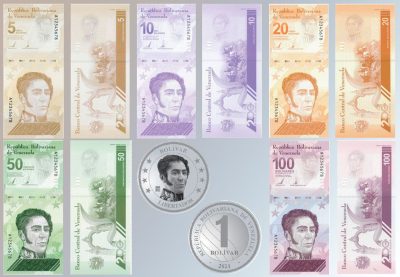Venezuela: Monetary Reconversion Hit Hard by Currency Speculation
In contrast to the 2018 redenomination, the Maduro government has not announced any other economic measures.

All Global Research articles can be read in 51 languages by activating the “Translate Website” drop down menu on the top banner of our home page (Desktop version).
Visit and follow us on Instagram at @crg_globalresearch.
***
Venezuela’s national currency has devalued by over a quarter as the government rolls out a monetary reconversion.
On October 1, the digital bolívar (BsD) replaced the sovereign bolívar (BsS), knocking out six zeroes from its predecessor (1 BsD = 1,000,000 BsS). The two legal tenders will coexist in the coming weeks as the newly minted bills from 5 to 100 BsD, as well as a 1 BsD coin, begin to circulate.
However, the imminent redenomination led to a currency speculation drive, with the black market rate going from 4 million to 4.8 million BsS, or 4.8 BsD, per 1 US dollar in the past week. The exchange value went up further to 5.14 BsD on its first day, meaning that the Venezuelan currency lost 28.5 percent of its value in ten days.
Social media users and analysts decried the speculative frenzy, with Economy Vice Minister William Castillo calling it a “political operation” and blasting opposition commentators who justify “attacks against the economy.”
With the bolívar redenomination, the Venezuelan government has prioritized the need to boost digital operations to facilitate transactions and minimize the risk of cash shortages.
Most bank platforms were up and running on Friday morning, with technical difficulties persisting for the Bank of Venezuela into the afternoon. The public bank, the country’s largest, was recently offline for several days due to what authorities denounced as a cyber-attack originating in the United States. The smaller Bicentenario Bank, also state-owned, suffered an alleged Distributed Denial of Service (DDoS) attack on September 23 but had its services restored in hours.

Quarterly devaluation of the sovereign bolívar since its introduction. Venezuela’s currency has devalued almost entirely but the pace has slowed in recent months. (Venezuelanalysis w/ BCV data).
The new reconversion comes just three years after the introduction of the sovereign bolívar. In August 2018, the Nicolás Maduro government removed five zeroes and replaced the strong bolívar (BsF) as part of a broad set of economic reforms.
At the time, Venezuelan authorities hoped to tackle runaway inflation in the midst of a years-long economic crisis. But the devaluation-inflation spiral continued unabated after a few weeks of stability, forcing the Venezuelan Central Bank to twice introduce new, higher denomination bills. Liberal overtures such as the lifting of currency exchange controls slowed down devaluation but not entirely.
In contrast to 2018, the digital bolívar rollout has not come alongside other economic measures. The price of subsidized fuel reportedly jumped by 100 percent without any official announcement. Nevertheless, filling a 40L tank costs a mere 0.4 BsD, or US $0.08. Privately run gas stations continue to sell gasoline at $0.50 a liter.
The Venezuelan economy has been mired in a years-long crisis that was significantly worsened by wide-reaching US sanctions. GDP has contracted by more than 65 percent, though some forecasts have the country registering growth in 2021 for the first time since 2013.
The Maduro executive has looked to kickstart the economy by offering increasingly favorable conditions for private investment through tax exemptions and deregulation. But legislative initiatives such as the Anti-blockade Law and Special Economic Zones have faced controversy, with Chavista groups and intellectuals arguing that the measures endanger the country’s sovereignty and break with former President Hugo Chávez’s socialist project.
*
Note to readers: Please click the share buttons above or below. Follow us on Instagram, @crg_globalresearch. Forward this article to your email lists. Crosspost on your blog site, internet forums. etc.
Featured image: Despite inflation slowing down in recent months, Venezuela is rolling out a second monetary reconversion in three years. (Archive)

